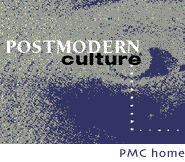Notices: Publication Announcements
Volume 12, Number 2
January, 2002
Organdi Quarterly
The latest issue of Organdi Quarterly is now available. An international journal of social sciences and contemporary issues, Organdi is published quarterly in English and French including peer reviewed articles, special issues, interviews, cultural reviews, letters to the editor, and online exhibitions. Organdi's third issue focuses on "utopia: legacies, liabilities," with a video by thieum@, articles by Anton Kozlovic and Ingo Mörth, interviews by Markus Gerlach and Matthieu Faullimmel, a review of Sudhir Venkatesh's book American Project, a text by Rémy Oudghiri, and a re-mix of the Korgi's hit by MrLearn.
We hope that you will find interest in our site: <http://www.geocities.com/organdi_revue>
Back
Scenes from Postmodern Life
Scenes From Postmodern Life
by Beatriz Sarlo
Translated by Jon Beasley-Murray
University of Minnesota Press; 208 pages; 2001
ISBN 0-8166-3008-9 (hardcover) $44.95
ISBN 0-8166-3009-7 (paperback) $17.95In this bracing book by one of Latin America's foremost intellectuals, Beatriz Sarlo offers a remarkably clear, forthright, and forceful statement of what precisely cultural criticism is and might be in our age of manic consumption, commercialization, popularization, and mass marketing. Her readings of cultural practices such as television zapping, playing video games, or trawling the shopping mall; her vignettes about traditional intellectuals and practitioners of high art; her discussions of popular culture and the dissolution of social identities; these, as well as Sarlo's own writerly stance, go a considerable way toward developing the role of thinking in global times.
For more information, visit the book's webpage: <http://www.upress.umn.edu/Books/S/%20sarlo_scenes.html>
Back
Cryptomimesis
Cryptomimesis: The Gothic and Jacques Derrida's Ghost Writing
In the last thirty years the living-dead, the revenant, the phantom, and the crypt have appeared with increasing frequency in Jacques Derrida's writings and, for the most part, have gone unaddressed. In Cryptomimesis, Jodey Castricano examines the intersection between Derrida's writing and the Gothic to theorize what she calls "Derrida's apoetics of the crypt."
by Jodey Castricano
November 2001, 176pp
ISBN 0-7735-2264-6 (hardcover) $65.00She develops the theory of cryptomimesis, a term devised to accommodate the convergence of philosophy, psychoanalysis, and certain Gothic stylistic, formal, and thematic patterns and motifs in Derrida's work that give rise to questions regarding writing, reading, and interpretation. Using Edgar Allan Poe's Madeline and Roderick Usher, Bram Stoker's Dracula, and Stephen King's Louis Creed, she illuminates Derrida's concerns with inheritance, revenance, and haunting and reflects on deconstruction as ghost writing.
Castricano demonstrates that Derrida's Specters of Marx owes much to the Gothic insistence on the power of haunting and explores how deconstruction can be thought of as the ghost or deferred promise of Marxism. She traces the movement of the phantom throughout Derrida's other texts, arguing that such writing provides us with an uneasy model of subjectivity because it suggests that to be is to be haunted. Castricano claims that cryptomimesis is the model, method, and theory behind Derrida's insistence that to learn to live we must learn how to talk with ghosts.
"An extremely intelligent and well-written analysis of Jacques Derrida's theories of writing. Castricano shows how Derrida's investigation of writing and the self that is created in and through language is a fundamentally Gothic story. She is obviously an expert in both Derrida and the Gothic, and is conversant with the critical traditions relevant to each. This book, with its insightful reading of Derrida, offers a valuable contribution to the development of Gothic studies."
--Anne Williams, Department of English, University of Georgia"A strong, lucid, and engaging book on a complex and highly abstract subject. Castricano demostrates a real grasp of Derrida and the major texts in the Freudian tradion and its revision, and she continually explains or inflects one point through another in a deft synthesis of theoretical points of view."
--Eric Savoy, Department of English, University of CalgaryJodey Castricano is assistant professor in the Department of English at Wilfrid Laurier University.
Back
Pixelpapers 18
PixelPapers 18 is out, full of reading for the new year, with a haunting little first-person piece on Aberfan by Irene Herry and poems by Frances Macaulay Forde, Les Wicks, Ann Davis, Donna Devaney, Kelly Pilgrim, Ryan Scott, Corey McHattan, Jean Frances, Dawn Bruce, John West, and Les Murray.
There is a first chapter of a new novel, Replenish The Earth, by Anna Jacobs (Sherry-Anne Jacobs) and shorts from Julie Keys, Christine Paice, Corey McHattan, and Kelly Pilgrim. Their works join over 740 titles accessible through the live index.
Photographs from my lonely, lovely city, (Perth, a.k.a. Dullsville), feature the Swan River, joining a series on Cottesloe Beach and Rottnest Island.
PixelPapers 18 is open for further contributions by plain e-mail (no text attachments please) over the next few weeks. We publish verse, short stories, first chapters, articles, reviews, news, and views, and especially welcome letters and articles on stage and screen. Graphics such as poem, story, or book cover illustrations are also welcome at <http://www.iinet.net.au/~pixpress/>
Issues 1-17 are also available on the site.
We don't pay for contributions as we have no income, but we offer exposure to an increasing readership. We are also happy to publish promotional details of contributors' books and forthcoming events of interest to writers. (Writers groups and centers should allow at least four days for copy to be posted.)
We are different because we don't mind re-publishing work that has been published elsewhere, as well as new work and work from new writers. Editorial decisions are made within the four-month publishing period.
Back
Publication Announcements
THIS ARTICLE AND OTHER CONTENTS OF THIS ISSUE ARE AVAILABLE FREE OF CHARGE UNTIL RELEASE OF THE NEXT ISSUE. A TEXT-ONLY ARCHIVE OF THE JOURNAL IS ALSO AVAILABLE FREE OF CHARGE. FOR FULL HYPERTEXT ACCESS TO BACK ISSUES, SEARCH UTILITIES, AND OTHER VALUABLE FEATURES, YOU OR YOUR INSTITUTION MAY SUBSCRIBE TO PROJECT MUSE, THE ON-LINE JOURNALS PROJECT OF THE JOHNS HOPKINS UNIVERSITY PRESS.

